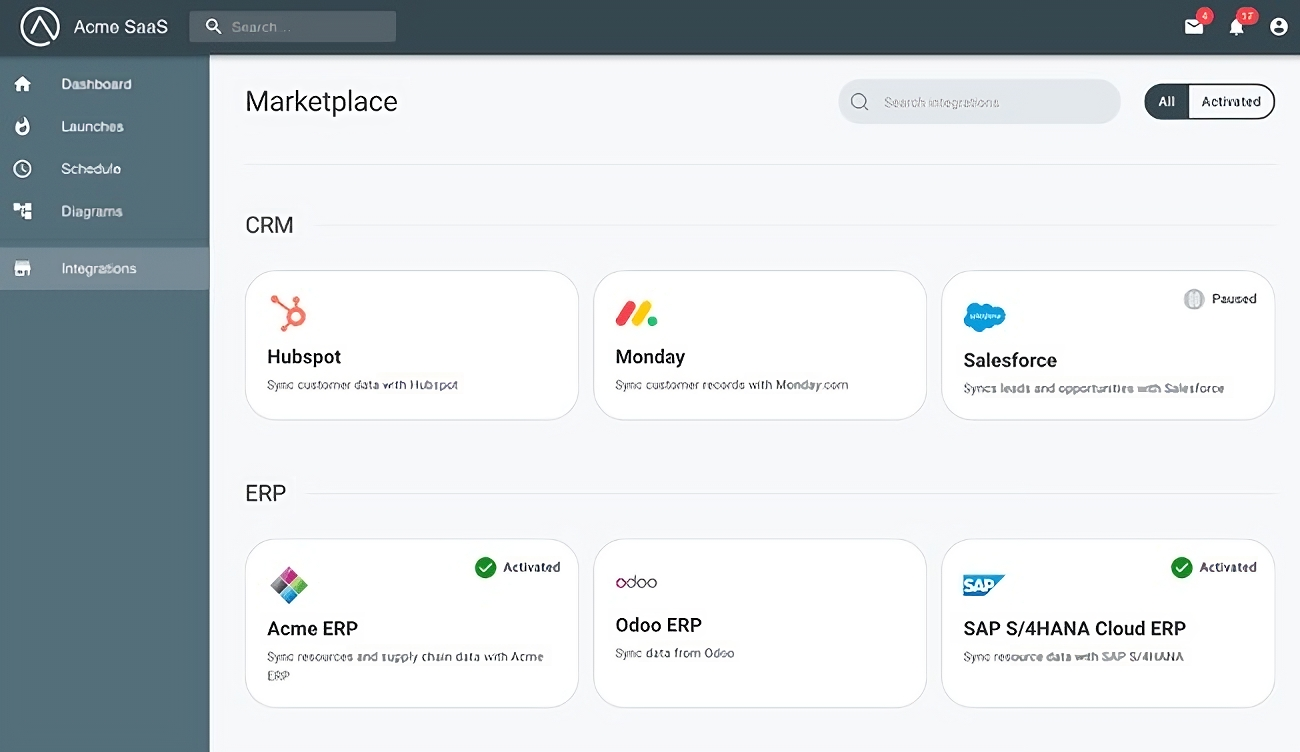IT groups in the present day should juggle an unlimited variety of instruments, apps and techniques. The typical firm was using 130 software-as-a-service (SaaS) apps as of 2022, in response to Statista — a quantity that’s impacting productiveness. Eighty % of firms responding to a current MuleSoft ballot mentioned that app integration challenges are slowing down their organization-wide efforts, resulting in knowledge silos and disconnected departments.
Michael Zuercher says that he skilled the SaaS app integration headache firsthand whereas bootstrapping his first startup, Zuercher Applied sciences, a public security company software program supplier.
“We constructed round 600 integrations to prospects’ different software program. It was completely mandatory, however grew to become a major burden and finally ate up over half of our R&D capability,” Zuercher instructed TechCrunch in an e-mail interview. “All through this time, we realized integrations remained a posh, distinctive and largely unsolved drawback for software program firms.”
One answer is what’s often known as integration platform as a service (iPaaS), a cloud-based sort of service that helps organizations tie in and unify their apps, processes and knowledge from a single pane of glass.
The iPaaS market is well-established at this level, having generated $3.47 billion in income in 2020 on its approach to greater than $9 billion by 2025. And corporations have embraced iPaaS; one survey from 2021 discovered that 66% of firms will spend money on iPaaS to deal with their knowledge integration and automation challenges.
iPaaS startup and incumbent choices abound. A number of embody Integration.app, which makes use of AI fashions to reconcile disparate apps and providers; Digibee, which not too long ago raised $60 million in enterprise capital; and Amazon’s not too long ago launched AWS AppFabric.
Zuercher thought he might — and nonetheless thinks he can — do higher.
Right this moment, he leads Prismatic, an iPaaS startup designing an answer to assist business-to-business (B2B) SaaS firms join their merchandise to the opposite merchandise their prospects already use. Zuercher co-founded Prismatic with Beth Harwood and Justin Hipple in 2019, aiming to streamline app integration growth to let SaaS firms extra simply hook up with third-party software program.
Prismatic’s platform provides instruments to attach apps through integrations and hooks from a single dashboard. Picture Credit: Prismatic
“SaaS firms are spending big quantities of time and sources on integrations,” Zuercher mentioned. “Prismatic reduces that burden by serving to SaaS firms simply construct integrations, deploy and handle these integrations at scale, and embed them of their options so their prospects can self serve.”
Prismatic provides a low-code integration designer, a local growth atmosphere, a administration console and a market the place prospects can toggle and configure integrations. The platform not too long ago launched an integration designer and new, expanded API connectors, “doubling down” on extra developer-focused performance, Zuercher says.
“We constructed Prismatic from the bottom as much as serve SaaS firms — not companies constructing inside integrations — so options SaaS firms want, like developer-focused tooling, customer-specific configuration, model management, embedding and scalability have been included from day one,” Zuercher mentioned. “Prismatic’s embedded iPaaS offers a approach for SaaS distributors to supply highly effective integrations as a local a part of their merchandise, lowering the burden of integration on IT departments.”
Zuercher wouldn’t reveal precisely what number of prospects Prismatic has at current. However he mentioned that the consumer make-up ranges from startups to Fortune 100 firms and that it drove annual recurring income progress all through 2023.
In a probably optimistic signal, Prismatic simply in the present day closed a funding spherical — a $22 million Collection B — led by 5 Elms Capital, the Kansas Metropolis–primarily based progress fairness agency, bringing Prismatic’s complete raised to $34 million. The brand new money shall be put towards rising the startup’s ~50-person crew, increasing R&D and enhancing Prismatic’s present instruments and software program.

Prismatic’s integrations market, which goals to simplify the method of connecting apps to one another. Picture Credit: Prismatic
“We determined to lift fairness to capitalize on the expansion we noticed in 2023 — a time when many SaaS firms have been taking a step again,” Zuercher mentioned. “In 2023, we noticed robust, constant progress all year long. We’re extra assured than ever that our product is making an affect for B2B SaaS groups, and this funding will speed up and develop our efforts.”
“Prismatic’s stellar progress since its Collection A, achieved in lower than a 12 months, has solidified the indispensable function of embedded iPaaS in B2B SaaS firms,” Austin Gideon, principal at 5 Elms Capital, added in a canned assertion. “We’re seeing intense demand throughout our portfolio of B2B software program firms for a platform to assist increase integration capabilities. Scaling software program firms are in a position to understand robust returns on funding by using Prismatic’s platform, permitting groups to stay centered on delivering new merchandise to prospects. Partnering with this crew once more for the Collection B provides us the chance to make significant developments and enhancements in the way forward for SaaS.”



Discussion about this post